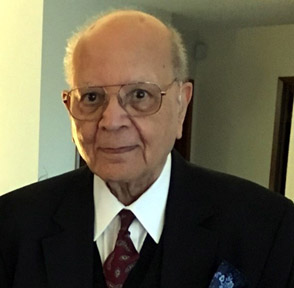WASHINGTON, D.C. (TIP): Dr Kamal D Verma, an acclaimed scholar of South Asian literature, died of natural causes this week here in the American capital. He would have turned 92 in April.
Professor Verma taught for 42 years at the University of Pittsburgh at Johnstown (UPJ) in Pennsylvania. After retirement, he continued to serve as Professor Emeritus and an advisor to the University President, focusing on recruiting more diverse faculty and students from South Asia.
He was also one of the founding members of the South Asian Review and the South Asian Literary Association — two nationally acclaimed scholarly efforts aimed to promote Indian and other South Asian writers and ideas.
Dr Jem Spectar, President of UPJ, called Dr Verma “a brilliant scholar, an exceptional teacher and guide, a highly respected colleague, and a dear friend”.
“His students speak of a great intellect: a professor who deepened their critical thinking, analytical, and writing skills, someone who deepened their understanding of our world, and someone whose classes prepared them for lifelong success,” Spectar said.
Dr Verma was born in 1932 in Punjab, India. He was the eldest child in a large family, and the first member of his extended family to attend college.
He completed his BA from DAV College, Jalandhar, in 1951, followed by a BA in teaching from Agra University in 1953 and an MA in English from Panjab University in 1958.
In India, he became the principal of a teacher’s college in Punjab where he served until 1963, when he departed for the United States on a Ford Foundation Fellowship to obtain his Specialist in Education degree at the University of Northern Iowa. He then pursued further professional studies in literature, leading to his PhD from the University of Alberta in Edmonton, Canada.
Dr Verma, his wife Savitri, also a teacher and head of a women’s college in India, and their five children settled in Johnstown, Pennsylvania in 1971. They were the first Indian-American family to move to the area.
Dr Verma’s children pursued varied careers in business, medicine and law. His son Richard would go on to serve as the US Ambassador to India for President Obama, and he currently serves as the Deputy Secretary of State, the highest-ranking Indian American in the State Department ever. Richard Verma was the first ever Indian-American to be US Ambassador to India.
Verma was in New Delhi last month where he gave a talk at the Observer Research Foundation, and noted how his father, like millions of other Indian Americans, started over from next to nothing, rebuilt in their new country, but maintained and even strengthened ties with India.
“My father tells a great immigrant story of showing up in the United States with USD 14 and a bus ticket. He left so much behind and he took a big risk. He was brave. And he never let us forget our roots. What an amazing role model we had,” remarked Ambassador Verma.
“These are the stories and journeys that bind our two countries together.” Prime Minister Narendra Modi, in a letter sent to Ambassador Verma this past week, wrote that Professor Kamal Verma “was a true embodiment of the grit and determination demonstrated by every Indian immigrant.
He worked hard to give a better life to his family in a foreign country, and at the same time continued to remain true to his Indian roots…and will always be remembered in his homeland.”
Dr Verma’s writings were widely admired and acclaimed, especially his three published books. His second book, The Indian Imagination, focused on several of the leading writers of the Indian colonial and post-colonial periods of Indian history. His last book, Understanding Mulk Raj Anand, focused on noted Indian writer Mulk Raj Anand and included a series of letters between Dr Verma and Anand over 15 years, focusing again on the ideas that inspired the colonial struggle for independence.
He released the book in the US and India in 2017 with significant critical success. He even presented the book to Prime Minister Modi in 2018.
During his career, Dr Verma would end up teaching thousands of students in India, Canada and the United States, and he published dozens of articles, in addition to the three books. Professor Nalini Iyer of Seattle University and the editor of the South Asian Review said: “Dr Verma was a towering figure who had an impact on so many. He paved the way for South Asian scholars and literature in the United States and cared for his family and friends at every turn. He also trained and inspired hundreds of faculty members across the globe in the field of South Asian literature and philosophy. This is a gift for which he will be long remembered.”
